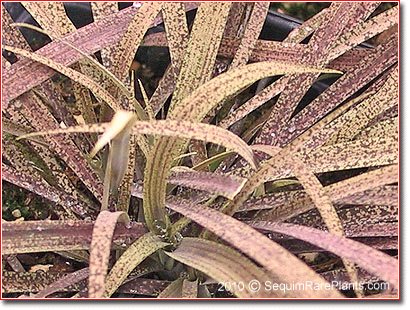
Arthropodium candidum 'Purpureum'
 Arthropodium candidum 'Purpureum'
Arthropodium candidum 'Purpureum'• Click here to visit our Main Plant List page for current availability of this plant
• common name: dwarf rock lily
• flowering season: groups of tiny white flowers bloom in summer on thin 12-inch tall stems
• height: leaves at 5 to 10 inches, flowers to 12 inches
• Light requirements: full sun
• Soil requirements: average
• Water requirments: average and well drained
• Growth habit: grows as a clump
• How to propagate: dividing in early summer, or from seeds
• Leaf type: narrow, grass-like dark leaves
• Ways to use it such as in a pot or otherwise: in milder climates it makes a good edging plant or makes a good ground cover where there will be no foot traffic; also is good to edge large planter boxes or pots
• Special characteristics: the maroon to chocolate coloring of the leaves is darkest in strong sunlight and will be greener in shade
• Other points of interests: will seed itself into nearby areas with each new plant having the same color of leaves
This plant's common name is New Zealand rock lily or dwarf rock lily. It is an easily grown bulbous perennial from the South Island of New Zealand. A young, potted plant will have short three to five-inch tall thin grass-like fleshy leaves that are bronzy-purple spotted brown above and greyish green below. An older plant in the garden will grow taller to ten or twelve inches and grow into a thick clump. Thin sprays of tiny white flowers open on stems of a foot or so in June and contiunue later if older flower stalks are removed. The flowers are followed by fruit containing black seeds that germinate easily. It likes regular watering and partial shade where summers are hot, or full sun otherwise. This is semi-evergreen in the winter. It goes by different names, sometimes as 'Purpureum' and other times by 'Rubrum' or 'Maculatum.' Its is related to lilies (Liliaceae), but is placed in a different family, Laxmanniaceae. USDA Hardiness Zones 7-9.